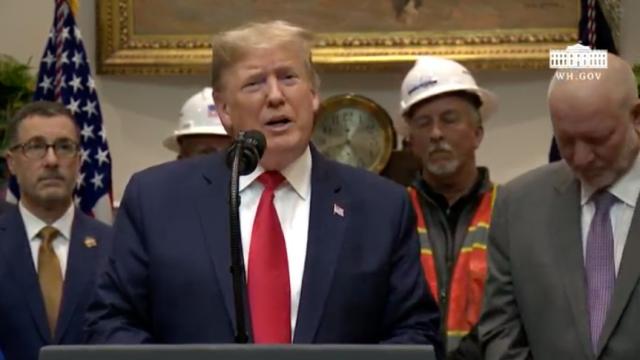
President Donald Trump announces his proposal to streamline the federal permitting process for major projects governed by the National Environmental Policy Act. (Source: White House video screenshot)
Updated at 2:19 p.m.
President Donald Trump on Jan. 9 unveiled proposed reforms to the National Environmental Policy Act (NEPA) that would streamline the federal approval process for infrastructure projects.
Under the proposal, federal agencies would no longer consider cumulative impacts of new infrastructure, which courts have interpreted as compelling studies to show the effects of allowing more greenhouse gas emissions that derive from a project. It also includes how the results of climate change, including rising sea levels, would affect a project over the long term.
In an address from the Roosevelt Room in the White House, the president said his plan would reduce the average permitting timeline for major projects by 70% to about two years.
“In the past, those seeking infrastructure permits have had to go to numerous federal departments, all over,” Trump said. “So, you’d go to these federal departments and agencies, requesting approval from countless governmental bureaucrats, each of whom was empowered to hold up the process and leave urgently needed projects in limbo.”
He said that the new One Federal Decision would require federal agencies to work closely together to deliver one decision.
“The time that is required to [build] a new project is now unsustainable,” said Transportation Secretary Elaine Chao during the signing ceremony for the proposal. “We all care about the environment. What we are talking about are cumbersome, unnecessary, overly burdensome, duplicative and outdated regulations. Many of these regulations have not been updated, modernized in decades.”
NEPA was signed into law by President Richard Nixon in 1970. It was the first major environmental law in the U.S. and requires federal agencies to assess the environmental effects of their proposed actions prior to making decisions.
The proposal was welcomed by the American Petroleum Institute (API).
“Endless and repetitive reviews for infrastructure, renewable energy, natural gas and oil projects have been misused to delay and derail development, which hurts job creation, reduces tax revenue and saps investments in communities across the country,” said API President and CEO Mike Sommers. “Reforming the NEPA process is a critical step toward meeting growing demand for cleaner energy and unlocking job-creating infrastructure projects currently stuck in a maze of red tape.”
U.S. Sen. Lisa Murkowski, R-Alaska, chairman of the Committee on Energy and Natural Resources, also expressed support.
“While I am still reviewing the details of this proposal, antiquated federal regulations often stand in the way of critical infrastructure and other important projects that can create jobs, improve our standard of living and energy security, and yet still fully protect the environment,” Murkowski said. “The president and his advisers deserve credit for leading the charge to bring our 1970s-era permitting processes into the 21st century.”
Following a 60-day comment period and two hearings, the final regulations would likely be issued in the fall. However, given the law’s requirements and federal court interpretations, it’s not clear that the administration will succeed in putting them into effect.
Thaddeus Lightfoot, formerly a trial attorney with the environmental division of the U.S. Department of Justice, noted that proposed regulations from the Council On Environmental Quality (CEQ) cannot change the NEPA requirements.
“Federal courts, construing NEPA as drafted by Congress, have long held that greenhouse gas emission impacts are impacts that must be evaluated in preparing environmental review documents under NEPA,” Lightfoot said in an email. “NEPA requires an analysis of cumulative impacts, including the cumulative impacts of air emissions such as greenhouse gases, from reasonably foreseeable proposals in addition to the proposed project evaluated.
“CEQ regulations cannot change statutory requirements—only Congress may amend the statute,” he added. “Therefore, any proposed changes to evaluation of climate change in NEPA cumulative impacts analysis should come from Congress, not from proposed CEQ regulations.”
The plan was not popular with environmentalists.
“The Trump administration’s effort to punch loopholes into long-standing protections under the National Environmental Policy Act would put communities at risk and worsen climate change,” said Vickie Patton, general counsel of the Environmental Defense Fund, in a statement. “The Trump administration has a legal and moral duty to protect all Americans, especially our children, from climate pollution and industrial environmental threats. This unlawful and dangerous action takes our country in the wrong direction.”
RELATED:
Trump’s Order Seeks To Curtail States’ Ability To Delay Energy Projects
Opinion: Behind Trump’s Executive Orders
Trump Administration Moves To Limit State Powers To Block Pipelines, Terminals
Recommended Reading
Petrobras to Step Up Exploration with $7.5B in Capex, CEO Says
2024-03-26 - Petrobras CEO Jean Paul Prates said the company is considering exploration opportunities from the Equatorial margin of South America to West Africa.
E&P Highlights: April 15, 2024
2024-04-15 - Here’s a roundup of the latest E&P headlines, including an ultra-deepwater discovery and new contract awards.
Valaris Updates Fleet Status
2024-02-19 - The backlog of these contracts and extensions is valued at $1.2 billion.
After 4Q Struggles, Transocean’s Upcycle Prediction Looks to Pay Off
2024-02-21 - As Transocean executives predicted during third-quarter earnings, the company is in the middle of an upcycle, with day rates and revenues reaching new heights.
E&P Highlights: Feb. 26, 2024
2024-02-26 - Here’s a roundup of the latest E&P headlines, including interest in some projects changing hands and new contract awards.






